Salvadoran coffee: with sour, bitter, sweet and other taste characteristics
Follow the caf é (Wechat official account vdailycom) and found that Beautiful Cafe opened a small shop of its own.
Salvadoran coffee is one of the best beans in Central America, light, fragrant, pure, slightly sour, and characterized by excellent balance of flavor. With sour, bitter, sweet and other taste characteristics, the best baking degree is moderate, deep. It is ranked alongside Mexico and Guatemala as the producing countries around Asa and Merdo, and is fighting for the top one or two places in China and the United States with other countries.
Coffee in El Salvador is graded according to altitude. The higher the altitude, the better the coffee. According to the elevation, the coffee is divided into three grades: highlands, mid-highlands and lowlands.
The highlands of origin are large coffee beans of all sizes, which are fragrant and mild in taste.

Climatic characteristics
Savanna climate. The plain area belongs to the tropical rain forest climate and the mountain area belongs to the subtropical forest climate. The average annual temperature is 25-28 ℃. The annual precipitation is more than 1800 mm in mountain areas and about 1000 mm in coastal areas. The rainy season is from May to October.
Don't underestimate El Salvador's coffee production. In its heyday, it was once the fourth largest coffee producer in the world, but decades of civil war almost dragged down the coffee industry. fortunately, the war has stopped in recent years, and the coffee industry has come back to life. The only benefit that the civil war brought to the Salvadoran country was that the farmers' fields were barren and failed to catch up with the most popular Katimo exposure train in the past two decades, thus preserving the ancient varieties of bourbon and Tibica, that is to say, El Salvador still uses the most traditional shade planting, which is of positive significance to the aroma of coffee. In 2005, the Salvadoran mixed-race Pacamara boasted in coe, which confused many international cup testers and did not know how to grade it. It was never expected that this hybrid bean not only broke the mellow boundaries of coffee, but also expanded the visibility of Salvadoran coffee.
El Salvador boutique coffee is concentrated in the volcanic rock producing areas of Santa Ana in the west and Charantanan fruit in the northwest. In recent years, the top 10 cup tests are almost entirely from these two producing areas, with an altitude of about 9-1500 meters, mainly bourbon (68%). Followed by Pacas (29%), mixed-race Pakamara, Dulaai and Kaddura accounted for only 3%.
The coffee harvest lasts from November to March. The fresh fruit of coffee is picked by hand.
On the whole, Salvadoran coffee inherits the mild quality of Sino-American coffee, which is soft, slightly sour and has beautiful sweetness. At the same time, it also has its own characteristics: the aromatic taste is slightly sour and very soft; it is pure and has no miscellaneous flavor, and the taste balance is excellent; the smooth feeling like cream chocolate is impressive; the dense feeling of coffee in the mouth gives the coffee a deep taste and a long finish.
Salvadoran coffee is graded according to the altitude of planting, with the highest grade being SHG:
More than SHG:Strictly High Grown-1200 meters
More than HG:High Grown-900 meters
Above CS:Central Standard-600 meters.
Important Notice :
前街咖啡 FrontStreet Coffee has moved to new addredd:
FrontStreet Coffee Address: 315,Donghua East Road,GuangZhou
Tel:020 38364473
- Prev

Cuban Crystal Mountain Coffee: only make individual Coffee
Cubita is produced in coffee from the pollution-free Crystal Mountain in the high altitude of Cuba, which is adjacent to the Blue Mountain Mountains of Jamaica and has similar climatic conditions, comparable to Jamaican Blue Mountain Coffee. Crystal Mountain is also known as the Blue Mountain of Cuba. So there are a lot of coffee under the banner of the Cuban Blue Mountains, but the purest Crystal Mountain Coffee Cubita is allowed to use Cuban water.
- Next

2017 Salvadoran coffee exports fell slightly
According to official statistics, coffee exports from El Salvador fell slightly by 0.67 per cent in the first three months of the 2016-2017 harvest compared with the same period last year. The Salvadoran Coffee Commission (CSC) said that between October 1 and December 31 last year, El Salvador exported a total of 30, 5936 metric tons of coffee, compared with 30, 6180 metric tons in the same period last year. Due to the country of coffee this year
Related
- Detailed explanation of Jadeite planting Land in Panamanian Jadeite Manor introduction to the grading system of Jadeite competitive bidding, Red bid, Green bid and Rose Summer
- Story of Coffee planting in Brenka region of Costa Rica Stonehenge Manor anaerobic heavy honey treatment of flavor mouth
- What's on the barrel of Blue Mountain Coffee beans?
- Can American coffee also pull flowers? How to use hot American style to pull out a good-looking pattern?
- Can you make a cold extract with coffee beans? What is the right proportion for cold-extracted coffee formula?
- Indonesian PWN Gold Mandrine Coffee Origin Features Flavor How to Chong? Mandolin coffee is American.
- A brief introduction to the flavor characteristics of Brazilian yellow bourbon coffee beans
- What is the effect of different water quality on the flavor of cold-extracted coffee? What kind of water is best for brewing coffee?
- Why do you think of Rose Summer whenever you mention Panamanian coffee?
- Introduction to the characteristics of authentic blue mountain coffee bean producing areas? What is the CIB Coffee Authority in Jamaica?

